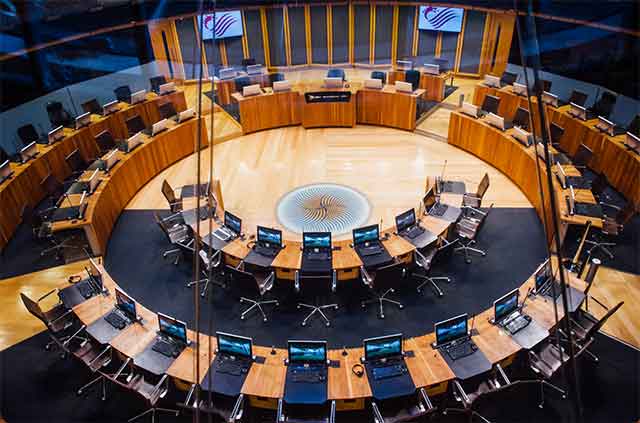Senedd members called for greater support for allied health professionals, warning of an ageing workforce and staff shortages while demand for services continues to grow.
Mabon ap Gwynfor said allied health professionals (AHPs) – more than a dozen professions from paramedics to radiographers – make up around a quarter of the NHS workforce.
But Plaid Cymru’s shadow health secretary told the Senedd that allied health professionals are “constantly undervalued” and receive “far too little attention”.
Mr ap Gwynfor called on the Welsh Government to develop a long-term workforce strategy as he led a debate on a motion backed by the Conservatives and Liberal Democrats.
He said: “Wales invests in training the next generation of AHPs, yet shockingly, many of them are unable to secure employment…. These are highly skilled, motivated individuals trained at public expense but often left underemployed or forced to leave Wales for work.”
‘Postcode lottery’
Senedd members warned of the “postcode lottery”, with Mr ap Gwynfor saying: “Too often, your ability to access life-changing support depends on where you live, not what you need.”
The Society of Radiographers has warned of a chronic shortage of radiographers across the NHS, with an average department vacancy rate of 15%. Wales also has fewer speech and language therapists per head than anywhere else in the UK and trains only 55 a year.
The Conservatives’ Mark Isherwood said: “To make matters worse, the youth justice board for England and Wales reports that 71% of sentenced children have speech, language or communication difficulties, showing just how important these services are.”
Mr Isherwood added: “Public Health Wales has predicted that by 2035-36, as many as one in 11 adults in Wales will be living with diabetes: 260,000 people. A significant proportion of these will need access to podiatric care to prevent complications of the foot and lower limb.”
Pointing to comments from the sector that the need for AHPs “has never been more urgent”, he told the Senedd: “For goodness’ sake, let’s address this.”
‘Mismatch’
Labour’s Jenny Rathbone said: “I simply hadn’t realised that allied health professionals are 25% of the workforce because they certainly don’t get 25% of the attention.”
Her party colleague John Griffiths echoed concerns about the barriers many patients face when accessing health care, including limited provision and long waiting times in some areas.
Gareth Davies reflected on his experience working for the NHS in north Wales for a decade before his election in 2021, saying AHPs are central to a functioning health service.
“The role of AHPs is getting more important and more in demand,” said the Conservative, who warned of a growing mismatch between supply and demand.
“They help people recover from strokes, regain independence after injuries, manage long-term conditions, overcome communication disorders and live healthier, more active lives, reducing pressure on GPs and avoiding unnecessary hospital admissions.”
‘Heartbeat’
Jeremy Miles, Wales’ health secretary, agreed about the need to invest to nurture and develop the workforce, describing AHPs as the “heartbeat of the health service”.
He told Senedd members there are more allied health professionals working in the NHS in Wales than ever before, with a 12% increase in the past three years.
He said Health Education and Improvement Wales has already developed a dedicated allied health professions workforce development plan to tackle current and future challenges.
Mr Miles drew attention to an extra £5m the Welsh Government made available to health boards every year from April 2023 to create more AHP posts.
“More than 100 additional full-time equivalent AHPs and support workers have been employed as a direct result of that additional investment,” he said.
The Senedd voted 31-0, with 16 abstensions, in favour of the motion following the debate

